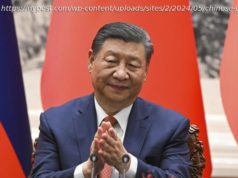The Communist Party was always going to try to tame Hong Kong, but its latest efforts are something else.
I am the chairman and majority owner of Apple Daily, one of Hong Kong’s largest newspapers, and since the city’s return to China in 1997, I have feared that one day the Chinese Communist Party would grow tired not only of Hong Kong’s free press but also of its free people. That day has come.
On Thursday, the party, acting through the National People’s Congress in Beijing, approved a plan to pass national security laws for Hong Kong that will mark the end of free expression and many of the individual liberties so cherished in the city.
Hong Kong is moving from the rule of law to rule by law, with the Chinese Communist Party determining all the new rules of this game.
Apologists for China, led by the Hong Kong chief executive, Carrie Lam, claim that the new legislation will only cover subversion, calls for secession, terrorism and other acts that truly threaten China’s national security. But the Hong Kong people are not fooled.
Since the ascent of Xi Jinping as China’s leader in late 2012 and early 2013, Hong Kong booksellers have been kidnapped and forcibly taken to the mainland, democracy activists have been beaten up by pro-Beijing thugs from the local triads and the city’s once-much-respected police force has turned on the people in the most brutal way. Even sanctuaries of freedom from outside the city are now imperiled here.
I joined Twitter recently, and started posting messages about the new law last weekend, just after the Chinese Communist Party first mentioned it:
Within a day, an article in the official Communist Party mouthpiece Global Times, citing experts, called my tweets “evidence of subversion” under the proposed national security law — this, even before the National People’s Congress formally endorsed the legislation on Thursday.
I have always thought I might one day be sent to jail for my publications or for my calls for democracy in Hong Kong. But for a few tweets, and because they are said to threaten the national security of mighty China? That’s a new one, even for me.
Hong Kong is a free society. Hong Kongers say what we want to say — at least, as Ms. Lam put it on Tuesday, “for the time being.” After the proposed national security law is enacted in Hong Kong — which could happen before the fall and the next local legislative elections — we will be able to say only what the Chinese government tolerates. Every sentence, every word will carry the risk of potential punishment on the mainland.
When it comes to free speech, this law will remodel Hong Kong so that it becomes like the rest of China.
It didn’t have to be this way. Although Hong Kong has been troublesome for Beijing since 1997 — there were protests in 2003 over another national security law and calls for true universal suffrage during the Umbrella Movement of 2014 — this was manageable trouble. But then last spring Ms. Lam, in a spectacular miscalculation, attempted to ram through the Hong Kong Legislature an extradition bill that would have allowed the Chinese Communist Party to drag Hong Kongers to the mainland to be tried for various crimes, including political crimes.






